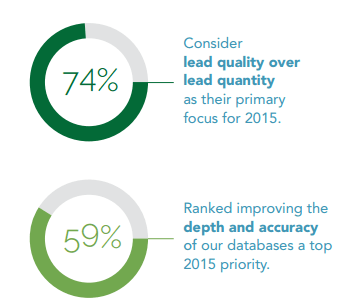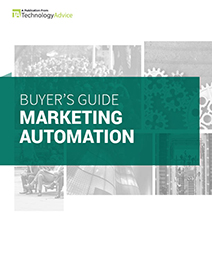With each passing quarter, the percentage of B2B marketers who prioritize database maintenance and refinement grows.
This is directly related to an industry-wide shift to data-driven thinking and decision-making, which has led marketers to seek out scalable methods for database upkeep and expansion.
Of course, this demand has lead to a proliferation of buzzwords such as data verification, database cleaning, and data enrichment.
Of these, enrichment holds the most promise for both marketing and sales because it involves adding new data points to your existing leads, thereby deepening your insight and supplying your sales team with more context.
READ ALSO: Why Every Marketer Should Know About Data Validation
This added context translates to an increase in lead quality, which has become the new standard for demand generation marketers who have quickly learned that an unfiltered waterfall of new leads will not deliver acceptable MQL and Closed Business numbers.
In fact, Netprospex revealed in their 2015 State of Marketing Data report that an overwhelming number of demand gen marketers are prioritizing lead quality over lead volume:

But before we dissect the relationship between data enrichment, lead quality, and closed business, we need to clarify what this term means.
Defining Data Enrichment
Technopedia defines the term like this:

Though this is in no way incorrect, it is vague. When you research the word enrich, Merriam-Webster offers three definitions:
- To make (someone) rich or richer
- To improve the quality of (something) : to make (something) better
- To improve the usefulness or quality of (something) by adding something to it
It’s the third definition that best encapsulates what data enrichment does. The first definition is irrelevant for marketing purposes (except for as a life goal perhaps) and the second is well covered by other terms like data verification and data cleaning.
Enrichment, as it relates to data, should refer specifically to the expansion of the contact record. This can be accomplished most quickly by hiring third parties with huge databases to augment your records with information from their own.
To quantify the importance of augmenting your data, it’s useful to consider the state of most B2B databases. In the previously mentioned Netprospex study, 66 percent of 233 million records analyzed were missing data for industry and company revenue.
If you aren’t sure what industry a lead is in, then how can you presume to know their needs or if they’ll be a good fit for your product or service?
Using Data Enrichment to Improve Lead Quality
So how, exactly, does this strategy lead to more closed business?
The process starts with lead grading — lead scoring’s less popular cousin.

Lead scoring and lead grading, as shown in Pardot’s automation system.
Where lead scoring examines the behavior of leads on your website and in your marketing campaigns and assigns a score based on specific criteria, lead grading studies firmographic aspects of each lead and assigns a grade based on how closely each lead fits your ideal customer profile.
Factors such as job title, industry, and revenue have tremendous influence over whether a lead will meet the standards sales needs to close a deal.
Say you work for a marketing automation company and you target CMOs. Sales only wants CMOs at companies of a certain size within specific verticals because those industries are the most mature in terms of marketing automation adoption.
They’re the best fit for your product, and targeting those leads is the best use of sales’ time.
Unless you have industry data in all your contact profiles, it’s all too easy to ship leads who have been responsive to your outreach, but whose businesses don’t prioritize automation because of the nature of their industry.
Using data to assign accurate lead grades will avoid these situations and have a direct impact on improving lead quality because lead quality is basically a combination of the lead’s behavior as well as their professional characteristics.
And the ROI for increasing quality is substantial — a 10 percent increase in lead quality can result in a 40 percent increase in sales productivity.
That’s because sales is talking to the right people (determined with lead grading) when they’re most interested (determined with lead scoring).
The Cons of DIY Data Enrichment
“But couldn’t I just use progressive profiling and form fields to get this data? Why do I need data enrichment?”
Valid question. The answer is because relying solely on form fields is a slow and sometimes inaccurate process.
For example, it’s well established that the number of fields on an online form has an inverse relationship to conversion rates. You won’t be able to find out everything you want to know with one form — at least not from very many people.
That means you’ll have to drive repeat downloads before you’re even sure if you’re targeting the right people. Not an ideal strategy.
Secondly, people lie. Not because they’re immoral, but simply because they’re averse to exposing themselves to more marketing campaigns. Again, the Netprospex study found 41 percent of contact records lack a phone number.
And many of those that do are inaccurate.
Data enrichment offers you a faster alternative to completing contact records while also factoring in greater accuracy.
Going Beyond Standard Form Fields
Finally, data enrichment supplies marketers with data points that would be difficult to obtain on a form due to the nature of the information.
Returning to our marketing automation example, you would also only want to target CMOs who can afford your software. This means company revenue plays an important factor. However, this is a high-friction asking point, because it’s an important piece of information about the CMO’s company.
The titanic databases of enrichment vendors contain such information for millions of companies, allowing you to get the data you need without sacrificing conversions on your landing pages.
Another option would be going beyond just job title to grade a lead. For example, if you target IT managers responsible for network security, then learning that each lead is, in fact, an IT manager is an important step, but it still leaves a lot of ambiguities.
Just because a lead has the right job title doesn’t mean they’re 100 percent the right customer for your product.
By using social data to enrich the profiles of IT managers in your database, you’ll be able to pinpoint which certifications each lead has and adjust your grading accordingly for those who hold security certifications.
***
Data enrichment isn’t without its drawbacks. You are paying extra to increase the velocity of your nurturing programs, and you have to carefully vet data vendors to pinpoint which company would make the best partner for your business.
However, given the meteoric rate at which data has become ingrained in the marketing and sales process, using data enrichment to add the right information to your database is a worthwhile undertaking.
If done well, it can result in greater lead quality, which measures the true effectiveness of your demand generation efforts.
Top CRM Software Recommendations

